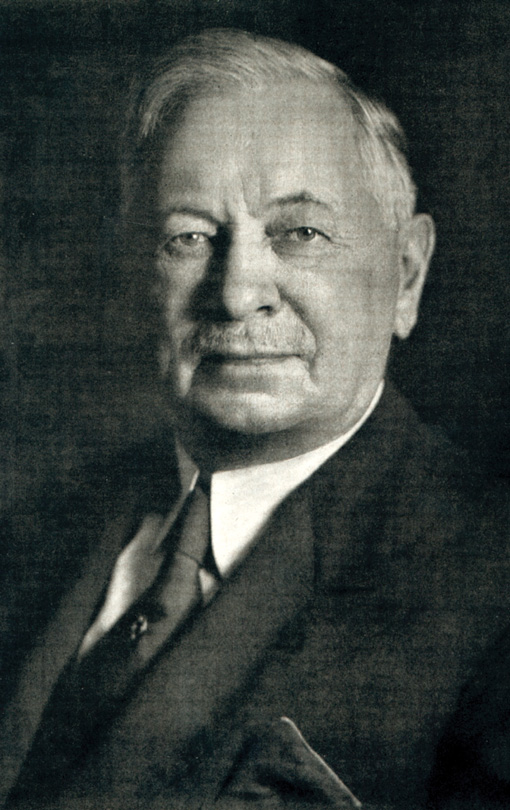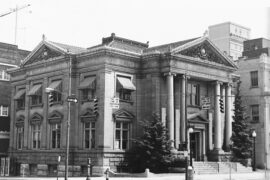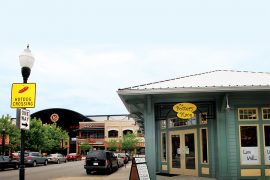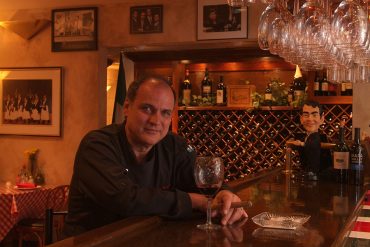By James E. Casto
HQ 46 | WINTER 2003
The time: May 21, 1938. The place: The main dining room of Huntington’s posh Hotel Frederick, lavishly decorated and filled to capacity with more than 300 distinguished guests, friends and coworkers who have come to honor a man whose true life story rivaled any of Horatio Alger’s rags-to-riches heroes.
A broadcast crew is on hand to beam the evening’s proceedings to a statewide radio audience as various speakers take the podium to acclaim the character and accomplishments of the guest of honor. Telegraph boys scurry in and out, carrying an ever-increasing number of wired messages lauding the honoree.
A giant birthday cake, ablaze with 75 candles, is wheeled into the room, and the assembled guests burst into song:
“Happy birthday to you …”
The guest of honor slowly gets to his feet as the crowd finishes the familiar refrain:
“Happy birthday, dear Colonel, Happy birthday to you!”
What thoughts swirled through the mind of veteran Huntington newspaper publisher Joseph Harvey Long as he stood before the cheering crowd that night? Perhaps his thoughts went back to his earliest days and the fate that brought him to Huntington.
As a schoolboy growing up in Pittsburgh, Long had a little hand press, and by the time he was 12 years old had established a thriving business printing calling cards, handbills and the like. By age 18 he was working 12 hours a day as a newspaper typesetter.
As a young man, Long worked as a printer on various papers in Pennsylvania, Ohio, New York and West Virginia. In Wheeling, he and his partner, H.C. Ogden, bought an all-but-defunct paper, renamed it The Wheeling News and turned it into a modest success. But Long wanted to run his own newspaper.
Hearing that a newspaper was for sale in Huntington, Long investigated, and in 1893 he bought The Huntington Herald and sold his interest in The Wheeling News to Ogden.
The match between The Herald and its new owner was an odd one. Newspapers of that day were intensely political. Long was a lifelong Democrat. The Herald was a republican paper. So perhaps it’s understandable that two years later, Long sold The Herald and bought The Advertiser, a paper as staunchly Democratic as its new owner.
In 1901, Long purchased property in the 900 block of Fourth Avenue, where the Keith-Albee Theater now stands, and built there what was then the most modern newspaper plant in West Virginia. But the ambitious Long had even bigger dreams, and in 1923 he built an even grander newspaper building on the corner of Fifth Avenue and 10th Street.
Meanwhile, The Herald had merged with The Huntington Dispatch to become The Herald-Dispatch, owned by Dave Gideon. In 1927, Long and Gideon brought together their newspaper operations, forming the Huntington Publishing Co., with Long as president. The Herald-Dispatch staff moved into The Advertiser building, where all mechanical and business operations were combined. The two papers’ news staffs, however, remained separate and highly competitive.
His newspaper accomplishments alone would have earned Long his full due in any history of Huntington. But from his earliest days in Huntington, he was active in the community.
Long was Huntington’s postmaster from 1916 to 1921, and was known as “The Colonel” — a title conferred on him by Gov. William E. Glasscock in 1911.
Although never a political candidate himself, Long was extremely active in the West Virginia Democratic Party. In 1932, he helped organize the Huntington chapter of the Roosevelt for President Club, and in 1934 he managed the successful U.S. Senate campaign of Rush Holt.
Elected president of the Huntington Chamber of Commerce in 1936, he was reelected for four consecutive years. He chaired the Good Roads Committee of the Chamber for more than a decade, lobbying for improvements to highways in the Huntington area.
In the wake of the disastrous 1937 flood, Long reached into his own pocket to aid those newspaper employees who suffered lost or damaged homes, and then played a key role in the effort to construct a floodwall that would protect the city against future floods.
In 1938, he led the campaign that saw Cabell County voters approve a $1.5 million school bond, which enabled the construction of the former Huntington East High School.
He was a director of the First Huntington National Bank, the Huntington-Ohio Bridge Co., the Ohio Valley Bus Co. and the Morris Memorial Hospital in Milton. He was also treasurer of the First Congregational Church for more than 30 years.
Long was a generous supporter of what was then Marshall College, maintaining especially close ties with the school’s journalism department. He was also a friend to the arts. He served as vice president of the Huntington Symphony Association and was a director and life member of the Huntington Galleries, now the Huntington Museum of Art.
Col. and Mrs. Long — the former Cora Hildreth Thompson of Steubenville, Ohio — had three sons: Luther Thompson Long, Paul Walker Long and Edward H. Long. All three were executives with the Huntington Publishing Co.
Doubtless many of those who gathered at the Hotel Frederick that May evening in 1938 thought they were paying tribute to the newspaper chief in the twilight of a long and distinguished career. Long, however, would prove to be a driving force at the newspaper and in the community for another two decades, remaining active until shortly before his death — at age 95 — on Dec. 28, 1958.
Those final years would see Long steer the Huntington Publishing Co. into an exciting new venture. As a newspaperman, he always insisted that his papers have the newest, most modern equipment. And so it should come as no surprise that he was quick to recognize the opportunities presented by radio and television. When WSAZ-TV took to the air on Oct. 15, 1949, it was one of the nation’s first television stations — and it was owned by the Huntington Publishing Co. The company also owned WSAZ Radio, the area’s first radio station.
In 1884, some 65 years before WSAZ-TV aired its first broadcast, a young Long was working at The Morning Dispatch in Erie, Pennsylvania. That year he turned in his resignation and publisher James R. Willard gave him a letter of recommendation:
“The bearer, Mr. J.H. Long, has been in my employ for about two years as pressman, most of the time running a three revolution Hoe in newspaper work. He is thoroughly competent, has no vices that I have ever discovered and is unusually reliable. He needs no overseer, but may be trusted to do his work as well without. He is the best newspaper pressman that I have ever had in my employ, and is a fair general pressman and compositor. I consider him an A-1 hand in every respect.”
“An A-1 hand in every respect” is surely a fitting description for Joseph Harvey Long.




